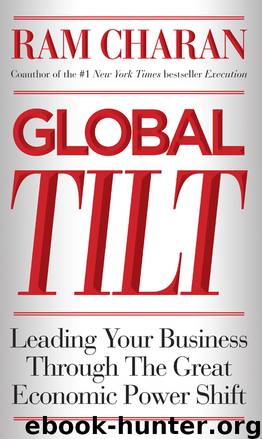Global Tilt by Ram Charan

Author:Ram Charan [Charan, Ram]
Language: eng
Format: epub
ISBN: 978-0-307-88914-0
Publisher: Crown Publishing Group
Published: 2013-02-25T16:00:00+00:00
IT’S TIME TO UNLEARN OLD LESSONS
The central mental skill of leadership today is the ability to identify long-term, large-scale opportunities and then build the capabilities to turn them into reality. The problem for many leaders is that this new turn in the road leads directly away from lessons they’ve learned for much of their careers: Stick to your knitting; stay with your core competencies. And as we shall see, the lesson has also been drilled into the minds of investors, who as a result take a dim view of bold ventures that might compromise near-term financial performance.
The concept of core competencies, introduced by C. K. Prahalad and Gary Hamel in 1990 to describe an organization’s unique strengths, has helped many leaders focus their business. In particular it has helped solve the problem of investing resources in non-value-adding activities or those the company was not especially good at. The outsourcing trend of the 1990s was largely driven by this kind of thinking, whereby businesses shed activities others could do better. Along the same line, Bain & Company partner Chris Zook has documented the importance of preserving and leveraging the company’s core business. Zook’s research catalogues the many failures that result when leaders lose sight of their core and argues persuasively that companies can unlock growth potential by extending and building on core strengths that are underutilized.
The concepts developed by Prahalad and Hamel and Zook are widely used in designing and developing corporate and business unit strategies; they are reliable guides to incremental growth, but there is a flaw. They make leaders internally focused and biased toward leveraging existing capabilities. This internal orientation puts you at risk of missing serious threats to the core business, some of which might require new capabilities. The way I see it, strategy making as usual is basically an inside-out, rearview-mirror approach that too often misses the opportunity or necessity for large-scale change.
Kodak provides a classic example. In the late 1990s it expanded its film business into China, an untapped market that then-CEO George Fisher found enticing. It was virtually impossible to get nationwide access to China back then, and Fisher worked tirelessly to develop relationships with Chinese state-owned enterprises, provincial governments, city governments, ministries, commissions, and banks, and spoke of having Zhu Rongji, who became Chinese prime minster in 1998, as a tennis partner. Eventually the doors opened. In 1998 the company committed to invest $1.2 billion in two joint ventures to manufacture and distribute film, paper, and photochemical products in the country. Fisher wisely established the ventures in a way that gave local partners minority stakes in exchange for business assets, ensuring that Kodak would have operational control. Despite the political risk, it seemed that Kodak was making a breakthrough, and investors approved.
But while the Chinese deals expanded Kodak’s core business, they did nothing to solve its bigger problem: the shift to digital photography. Kodak had been pioneering digital technology since the 1970s. It had a crude prototype of a digital camera as early as 1975 and in the mid-1990s helped Apple develop its QuickTake 100 digital camera.
Download
This site does not store any files on its server. We only index and link to content provided by other sites. Please contact the content providers to delete copyright contents if any and email us, we'll remove relevant links or contents immediately.
| Elections & Political Process | Ideologies & Doctrines |
| International & World Politics | Political Science |
| Public Affairs & Policy | Specific Topics |
| United States |
The Secret History by Donna Tartt(19092)
The Social Justice Warrior Handbook by Lisa De Pasquale(12190)
Thirteen Reasons Why by Jay Asher(8912)
This Is How You Lose Her by Junot Diaz(6888)
Weapons of Math Destruction by Cathy O'Neil(6281)
Zero to One by Peter Thiel(5802)
Beartown by Fredrik Backman(5756)
The Myth of the Strong Leader by Archie Brown(5509)
The Fire Next Time by James Baldwin(5447)
How Democracies Die by Steven Levitsky & Daniel Ziblatt(5219)
Promise Me, Dad by Joe Biden(5154)
Stone's Rules by Roger Stone(5088)
A Higher Loyalty: Truth, Lies, and Leadership by James Comey(4964)
100 Deadly Skills by Clint Emerson(4926)
Rise and Kill First by Ronen Bergman(4790)
Secrecy World by Jake Bernstein(4753)
The David Icke Guide to the Global Conspiracy (and how to end it) by David Icke(4720)
The Farm by Tom Rob Smith(4514)
The Doomsday Machine by Daniel Ellsberg(4490)
